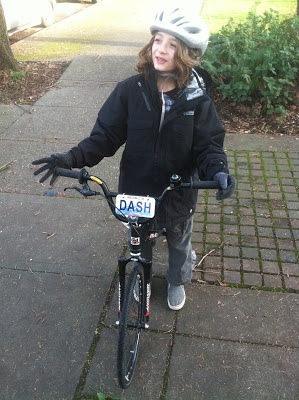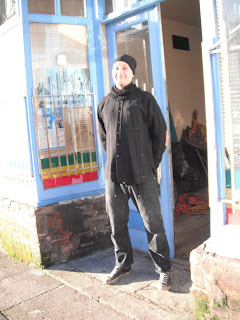Grand Jury resister Kerry Cunneen gave an interview to
Finn’s Revolution radio show. Here is a rough transcript of the interview:
Question: What is anarchism and how did anarchists find themselves at May Day in Seattle?
Kerry: Anarchism is a political philosophy centered
on the idea that a society without domination is better suited to foster
the wellbeing of its members. Anarchists are necessarily
anti-capitalists because capitalism hinges on exploitation and economic
division in society. We also oppose the concentration of power that we
refer to as the state. These various bodies of law, force, and control
seek to contain the possibilities for society and compel us all to
perpetuate capitalism. There are many other forms of social domination
that anarchists will fight to abolish, such as racism and patriarchy,
that are also deeply entwined with capitalism.
As for May Day, it is, among other things, an anarchist holiday. It
is a day that commemorates the militant labor struggle for the eight
hour work day and the anarchists who were killed or imprisoned by the
state for participating in this struggle. In Chicago, where the labor
struggle was particularly militant, the police opened fire on a picket,
killing and wounding picketers. The next day a demonstration was called
and a bomb was thrown at the police line, killing an officer and
wounding others. The state tried eight anarchists for the murder, and
regardless of whether they were at the demonstration or not, all eight
were sentenced to death or life in prison. We take May Day as a chance
to remember these militant struggles and to inspire us to keep fighting
against the state that wants us submissive or dead. Every year there are
demonstrations and other events in cities all over. In the Pacific
Northwest, Seattle was calling out to anarchists to come together and
have a really massive anti-capitalist march. Many anarchists answered
the call and showed up in Seattle that day.
Question: What was May 1, Seattle all about? Were there
progressive groups involved? What was your involvement? Were you
arrested or investigated? If so, how were you treated?
Kerry: There were a lot of events and marches scheduled for May Day in Seattle
this past year. A lot of them were related to occupy. I can’t say much about
the organizing of Seattle’s May Day because I don’t live there and was not
part of the organizing. I can say that May Day demonstrations have in many
places become somewhat placid, not resembling the spirit of resistance to
state control. They often get city permits, and designate peace police to
make sure the march is whatever the organizers want it to be. The anti-
capitalist march in Seattle was organized to be different. This march was
meant to be a disruption of capital. It was unpermitted and there was no
leadership in the march or expectation of abiding laws.
I was in Seattle at the anti-capitalist march on May Day. It was a glorious
day for anarchists, in my opinion. We effectively disrupted the goings on of
downtown Seattle. I was not arrested or anything, but clearly I have
become involved in the investigation somehow. But, with secret
investigations it is difficult to glean much information.
Question: Some people are appalled when property damage and
injury occur in these kinds of events. What can you say regarding that?
Kerry: I would say that property destruction is an important tactic in the fight
against capitalism. I think property destruction does a number of things
that further the struggle against domination. For one, it solidifies
for us and reminds us that the powers we fight are not abstract and
insurrmountable. They are
vulnerable to attack. I think also that when an institution which forcibly
maintains power over us is targeted by property destruction, this will often
resonate with others who experience the violence of that institution. It
makes us feel less alone and less like victims. I think that property
destruction has a good effect on those who carry it out as well. I think
most people need to unlearn submission and show themselves that they
have the capacity to act for
their own liberation. I think that when people burn cop cars, break bank
windows, or blockade a road (thwarting the transfer of goods and or law
enforcement) they are also demonstrating to themself some of the
magnitude of their ability to resist. I think too that in some cases the
economic damage of property destruction can be effective against the state
and capital. It is not as though breaking windows is an end goal, but it is a
tactic that people shouldn’t thoughtlessly cast aside as if it were the
introduction of violence into the fight against the state, instead of the
response to endless state sponsored violence.
There are many flawed arguments against property destruction, but
without a specific one to debunk, I would only extrapolate on this point that
in general people are accustomed to experiencing and absorbing state
violence as normal. There is a desensitization and sometimes a blame
shifting that goes on to justify state violence against people. But, when
people fight back against these concentrated powers it is sensationalized
and often viewed as unprovoked or illegitimate. In the case of a
demonstration in the streets, it is really awful to hear someone criticize the
breaking of windows as they gloss over the acute violence at the hands of
the state. Demonstrations are often brutally repressed, people are beaten,
pepper sprayed, arrested and imprisoned and this is expected and often
accepted by witnesses and people in general. How can a rational person
deny efforts of resistance the use of violence against those who hold it in a
monopoly? We want to win, we really mean to destroy capital, and for that
we will need to be open to the idea of property destruction. We have to
strip capital of its power over society. This is not an easy or voluntary
occurrence but one that is achieved by force. Property after all, is a farce.
Question: Kerry, you, Maddy, Matt &
Kteeo are currently refusing to cooperate with a Grand Jury in Seattle
which is investigating events which occurred during May Day protests
last year. First, why do you think the government has subpoenaed you and
has decided to pressure you to testify? And why are all of you refusing
to appear?
Kerry: I don’t know why I was subpoenaed to the grand jury. I am an
Anarchist, I am known to have been in Seattle on May Day and the Feds
are grasping at
straws trying to make a case against Anarchists in whatever way they can.
I doubt they have any idea who broke the courthouse windows nor do they
care. I think they are using the attack on the courthouse as a pretext to
bring down a heavy hand and try to scare Anarchists away from militant
resistance. It isn’t working and I am glad to think that this is frustrating to
the state.
I refuse to appear because I despise the state. They are working to undo
everything that Anarchists stand for. I refuse to help them on the principle
that prisons should be abolished. I refuse them because I am in complete
support of the crimes they are investigating. I refuse them with a visceral
hatred for the law and all of the lives they ruin. I am glad for the little bit of
resistance I can provide in denying them information. I respect and admire
Matt, Kteeo and Maddy for making the sacrifice that is involved in sitting for
and undetermined jail sentence. I just am not personally willing to take a
step in the direction of my own jail cell.
Question: Clearly the government is attempting to intimidate
you and anarchists and activists in general. First by calling you to
testify in a Grand Jury setting thereby trying to force you give up your
right to remain silent which exists in standard judicial courts, and
then by jailing some of you to wear you down. Can they legally keep any
of you in jail indefinitely until you testify, and just how long do all
of you think this can last? Can you talk about what legal actions are
being taken on your behalf?
Kerry: The state has the power to do lots of things, legal or not. Legally though,
people can be held in civil contempt for not testifying for a period up to 18
months or whenever the grand jury ends, whichever comes first. The grand
jury is slated to end by March of 2014 so there could be a lot of people in
jail for a long time over this. There are currently no legal actions being
taken on my behalf that I know of. I am not in need of any legal help unless
I am arrested. There doesn’t seem to be much that lawyers can do to help
people who are subpoenaed. All of the attempts to get the subpoenas
thrown out have been laughed out of the courts. They are going to do all
they can to turn people against their principles. I don’t see it working with
most Anarchists though.
Question: Kerry, where can listeners find out more about all this, and what can they do to get involved and help?
Kerry: So, the support group for the subpoenaed folks has a website. It is
nopoliticalrepression.wordpress.com. That is where you can go for news
and updates about the grand jury in the Pacific Northwest. It is also
where you can donate some much needed money which will help us fill the
commissary of
the folks in jail so they can continue to write letters, eat and such things.
We also need money for lawyers fees and in case of indictments coming
from the grand jury. There is a support site for the 5 people recently
indicted for alleged crimes during the various marches of May Day in
Seattle. The site is seattleantirepression.wordpress.com. There is also a
site, saynothing.info which is cataloging the numerous actions of property
destruction which are being carried out in solidarity with those resisting the
grand jury and its targets.
I would say that people can help by holding fundraisers and other events to
raise money and awareness about what is happening. You can contact
either support groups to figure out how to set something up in your area.
Probably the most important thing though, is that people continue to
struggle in the spirit of the anti-capitalist march on May Day. People need
to attack, in whatever way they feel they can, the institutions that hold us
down. We are all inspired by resistance and it helps those of us facing
repression to know that we don’t struggle alone.
Like this:
Be the first to like this.











































